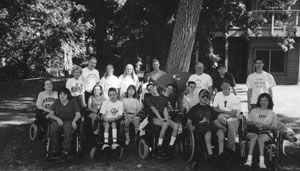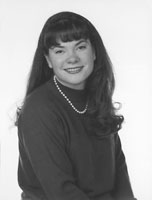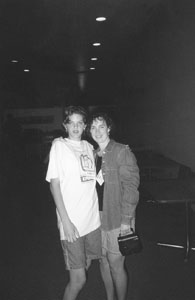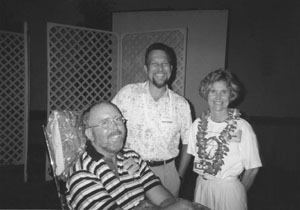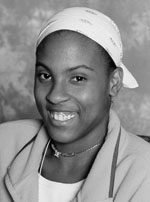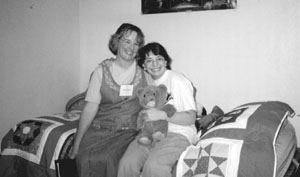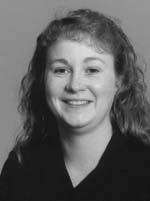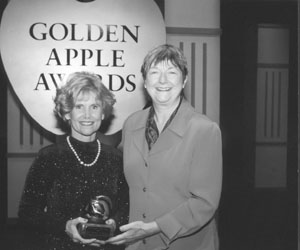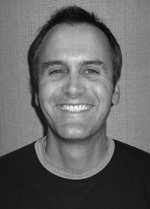Director's Digressions
As we move into the twenty-first century, this is a good time to reflect on DO-IT's past achievements and take a look at where we're headed. Since its inception in 1992, DO-IT has enjoyed tremendous growth and has been the recipient of many awards. Here is a brief look at DO-IT's past, present, and future. In the last seven years, DO-IT has undertaken the following projects:
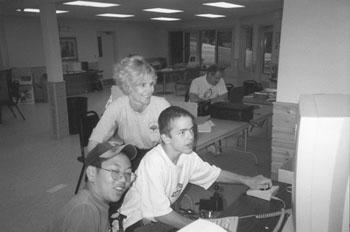
In October 1992, the National Science Foundation funded DO-IT (grant #9255803). Its purpose was to increase the representation of individuals with disabilities in science, mathematics, engineering, technology academic programs and careers. Nationwide activities during this three-year project included summer programs; mentoring college and work preparation for students with disabilities; disability and technology awareness training for students, educators, and service providers; and information dissemination. The DO-IT Scholars program began with funding from the grant. The videotapes Working Together: People with Disabilities and Computer Technology and Working Together: Science Teachers and Students with Disabilities were created under this grant. They can be purchased through DO-IT for $25 each.
In 1995, successful DO-IT activities were continued and expanded through a three-year grant, DO-IT Extension, from the National Science Foundation (grant #9550003). Areas of expansion included the DO-IT Campers program, where DO-IT brings computer technology and college/career preparation activities to existing summer camps for youth with disabilities (see Summer Camps 2000). DO-IT Pals, a worldwide electronic community of youth and mentors with disabilities, was also developed under this grant (see related article Recruiting DO-IT Pals). The videotape, College: You Can DO-IT!, which sells for $25, was created with this funding.
In 1995, Electronic Resources in Libraries was funded by the Telecommunications Funding Partnership to create and disseminate materials in order to educate library staff and administrators about how to make their electronic resources accessible to individuals with disabilities. Materials developed through that grant are now disseminated through DO-IT and the American Library Association. The project videotape World Wide Access shows how to create accessible Web pages and is sold through DO-IT for $25.
In 1997, FIPSE (Fund for the Improvement of Post-Secondary Education), of the U.S. Department of Education, funded DO-IT 2-4 (grant #P116B71441). The three-year project was created to help students with disabilities successfully transition from two-year to four-year post-secondary institutions.
In 1997, the U.S. Department of Education funded DO-IT CAREERS (Careers, Academics, Research, Experiential Education, and Relevant Skills), a three-year project to help college students with disabilities gain work skills through cooperative education, internship, and other preparatory experiences (grant #H078C60047-97). Project training materials Career Development and Students with Disabilities are sold through DO-IT for $60. In addition, three videotapes, It's Your Career, Finding Gold: Hiring the Best and the Brightest, and Access to the Future: Preparing Students with Disabilities for Careers, are sold for $25 each.
In 1997 the DO-IT's mentoring program was recognized by receiving a Presidential Award for Excellence in Science, Mathematics, and Engineering Mentoring. DO-IT received a $10,000 grant as part of the award. It was used to create a videotape, Opening Doors: Mentoring on the Internet, that is sold through DO-IT for $25.
In 1997, through a grant from the Seattle Foundation for DO-IT at CHMC, two computers, software, and adaptive technology were purchased for use in the "Teen Zone" by patients at Children's Hospital and Medical Center (CHMC) in Seattle. Patients use electronic mail, a World Wide Web browser, and word-processing software for academic and recreational activities.
NEC Foundation of America funded a grant in 1997 to develop Internet and college/career preparation materials to be distributed to camping programs for youth with disabilities nation-wide. These materials, titled Internet at Camp: How to DO-IT, are now sold through DO-IT for $60. In addition, the project videotape Camp: Beyond Summer is sold for $25.
In 1998, funding from Visio Corporation began supporting DO-IT's Show 'N Tell presentations to first grade classes in the Seattle and Spokane areas. Funds are used to pay successful college students with disabilities to deliver disability awareness presentations that are incorporated into classroom "show and tell'' activities.
In 1998, the Washington State Office of the Superintendent for Public Instruction funded DO-IT MATH-SCI (Making Accommodations That Help Schools Create Inclusion) with Eisenhower Professional Development Program Funds (grant #GR91915). In DO-IT MATH-SCI, pre-college math and science teachers were trained on how to fully include students with disabilities in laboratory and classroom activities. Training materials continue to be sold through DO-IT for $70. In addition, the project videotape presentation The Winning Equation is sold for $25.
In 1998, the National Science Foundation awarded a three-year grant (grant #9800324), Institutionalization of DO-IT, to institutionalize and replicate successful DO-IT practices in order to prepare more students with disabilities for college and careers; make information resources, programs, and facilities more accessible; and create more inclusive college and employment settings.
In 1999, the U.S. Department of Education (grant #H324M990010) funded CAREERS/K-12, a four-year project to increase employment opportunities and readiness for K-12 students with disabilities.
In 1999, the U.S. Department of Education's FIPSE program awarded a three-year grant (grant #P116D990138-01) to support CAREERS/Tech, a project to increase the representation of individuals with disabilities in the fields of business and technology.
The Samuel S. Johnson Foundation is the first to sponsor participants in the DO-IT Scholars program through the DO-IT in Your State program. Beginning in 1999, this three-year grant sponsored one student from the state of Oregon. Another student is being sponsored for three years beginning in 2000.
In 1999, Microsoft Corporation provided a grant to extend the DO-IT Campers program to two new states for two years through Microsoft Campers.
The JELD-WEN Foundation provided funding in 1999 to expand the program in the state of Oregon through the Oregon Campers project.
In 1999, the Mitsubishi Electric America Foundation awarded a grant to create Lessons Learned, a book and videotape based on the successful practices of DO-IT and other programs. The project is creating a videotape and book that highlight what makes people with disabilities successful.
In 1999, the U.S. Department of Education funded DO-IT Prof to develop and deliver professional development programs to college and university faculty nation-wide. Delivery methods include printed material, videotapes, presentations, Internet-based distance learning, and the World Wide Web.
In 1999, the University of Washington provided funds for DO-IT to participate in the Diversity Scale-up project. This project extends efforts to recruit and retain individuals from underrepresented groups (women, racial/ethnic minorities, people with disabilities) in the fields of science, technology, engineering, and mathematics (STEM) at the University of Washington.
The state of Washington, beginning in July 1998, provides on-going funding for DO-IT activities. These funds support DO-IT Scholars, DO-IT Campers, DO-IT Pals, information dissemination, and other programs for Washington residents. Through this funding source, DO-IT opened an auxiliary office in Spokane. We are proud of DO-IT's accomplishments, but much work remains to be done. We look forward to continuing to increase the representation of individuals with disabilities in higher education and employment in 2000 and beyond!
DO-IT is Honored:
DO-IT has been the recipient of numerous prestigious awards and invitations. The publicity and recognition provided by these awards have increased the impact of the project. Awards have included:
In December 1999, DO-IT was a recipient of the KCTS Golden Apple Award for excellence in education. DO-IT received $500 as part of the award.
In 1997, DO-IT's mentoring program was recognized by receiving a Presidential Award for Excellence in Science, Mathematics, and Engineering Mentoring. The award recognizes long-term commitment to providing opportunities for greater participation in science and engineering by all Americans. A $10,000 grant was provided as part of the award.
DO-IT was invited to showcase its efforts at the 1997 President's Summit for America's Future. DO-IT was one of fourteen programs nationwide chosen to demonstrate their creative use of technology in advancing the cause of national service. A DO-IT Scholar joined staff to represent DO-IT at the Summit.
In the 1996 Dynamic Partnerships Invitational Conference, DO-IT was showcased with a booth and presentation panel in Washington, DC.
The 1995 National Information Infrastructure Award in education went to DO-IT for its creative use of the Internet to improve education.
DO-IT received the 1995 Organization Award from the Washington Association on Post-Secondary Education and Disability (WAPED) for, "an outstanding record of service to people with disabilities in higher education."
The 1995 Community Partnership Award from the King County Vocational/Special Education Cooperative was given to DO-IT for exemplary work in developing the careers of youth with disabilities in cooperation with schools.
In 1995, DO-IT received a Public Relations award from the Association for Higher Education and Disability (AHEAD) for the videotape, Working Together: Faculty and Students with Disabilities.
DO-IT's videotapes to promote the success of individuals with disabilities have received praise locally, regionally, and nationally. Awards have included the Emerald City Award (see related article, DO-IT Video Director and UWTV Win Emerald City Awards).
